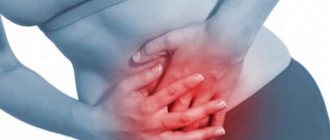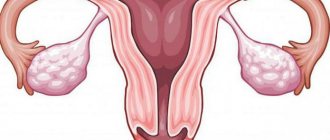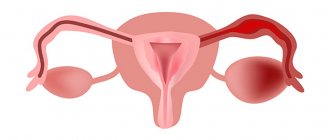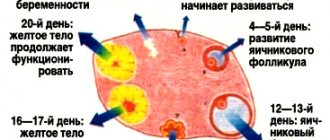For all women of reproductive age, menstrual flow is an integral part of their normal lifestyle. This is a natural mechanism that is controlled by hormones and is not always painless. Typically, women experience nagging, aching pain at the very beginning of the cycle, which is caused by contraction of the walls of the uterus, clearing its cavity of the inner layer. Such painful sensations are localized in the lower abdomen, and if they are not too intense, that is, “tolerable,” then you can cope with them with simple painkillers.
But there are situations when pain appears in the area of the appendages, and it occurs not only at the beginning, but also in the middle of the cycle. In this article, we will try to determine why the ovaries hurt during menstruation before and after the end of the critical days, and we will also identify situations in which you need to immediately contact a specialist to find out the cause of the pain, and when you can cope with it yourself or just endure it.
How the ovaries work, features of the right and left
The ovaries are paired organs that perform various functions in the body. Their work is regulated by the pituitary gland and hypothalamus of the brain.
On average, the volume of each ovary in a woman of the reproductive period is about 8-10 cubic centimeters, the dimensions are 2 cm * 2 cm * 3 cm. In girls and menopausal women, the volumes and sizes are much smaller. The ovary consists of stroma, which is represented by many follicles at different stages of development; on top they are covered with a thin connective tissue membrane. The ovaries are very well supplied with blood and innervated.
The ovaries are connected to the uterus by ligaments. Next to the ovary is the fallopian tube, its fimbrial section. It is he who “captures” the egg after ovulation, after which fertilization occurs. And the fallopian tube itself already leads into the uterine cavity; it is, as it were, a connecting link between the ovary and the uterus.
The ovaries perform several functions, the main ones being:
- they synthesize sex hormones;
- maturation of the egg occurs in them.
The number of follicles with immature female reproductive cells is formed in utero at the 20th week of pregnancy. With the onset of puberty, one follicle is selected each month to grow and potentially contain an egg that can be fertilized. Therefore, over the years, the supply of germ cells decreases, as soon as it reaches a minimum, menopause occurs.
All changes in the ovaries in a healthy woman take about a month. First, the follicle is selected, then it grows to the maximum possible value, after which it ruptures and the egg is released. At the site of the follicle, a corpus luteum forms, which gradually fades away if pregnancy does not occur. Subsequently, a microscar remains in this place. And so on every month.
Despite their almost complete identity, the right and left ovaries have different “neighbors,” and their blood supply also differs. The right ovary is adjacent to the appendicular process; inflammation of one of the organs can give similar symptoms. In addition, it has a large network of blood vessels, so ruptures, inflammation and other pathological conditions occur more often.
We recommend reading about what menstruation is like after ovarian apoplexy. From the article you will learn about the reasons for changes in the menstrual cycle after apoplexy, and the characteristics of menstruation.
And here is more information about how menstruation occurs with adnexitis.
How to relieve pain
To reduce pain on critical days, it is recommended, if possible, to exclude the use of certain types of activities:
- a ride on the bicycle;
- roller skating, ice skating;
- prolonged stay of the body in a sitting position;
- wearing tight, body-constraining clothes and underwear.
It's better to avoid cycling
To relieve unpleasant symptoms, you should take regular rest breaks and adhere to a dietary diet during a given period of time.
Be sure to exclude alcoholic beverages, flour, salty, and fried foods.
Why can the ovaries hurt in the first phase?
The first 14 days of the cycle are the quietest, if you do not include the menstruation itself. At this time, the dominant follicle is just beginning to grow in the ovaries. It is extremely rare for the ovary to rupture or cysts to form. Therefore, pain may be bothersome in the following cases:
- Exacerbation of chronic inflammation of the appendages. Usually the starting point for this is the days of menstruation;
- Ectopic pregnancy. It can only be detected at this time, after more or less normal menstruation has passed, although such cases of ectopic pregnancy from the previous cycle are rare.
Ovaries during menstruation
During menstruation, women often o. In fact, pain is not always associated with them. The ovaries are calm during menstruation, they are preparing for a new cycle. Unpleasant sensations may be associated with the following conditions:
- Endometrioid pain . Their severity will depend on the number and size of lesions and the presence of adhesions.
- Due to contraction of the uterus . The myometrium intensively tries to expel the remnants of the functional endometrium and blood from the cavity, while tension of all tissues occurs, which can cause unpleasant pulling sensations.
- Inflammatory processes . During menstruation, chronic infectious processes in the pelvis often worsen due to a physiological decrease in immunity.
- Functional cyst. Its likelihood is higher if there is a delay; sometimes it does not yet have time to regress before the onset of menstruation.
If a girl is bothered by pain during menstruation that has not previously occurred, she should consult a doctor to rule out pathological conditions.
Unpleasant phenomenon
Why do you worry about nausea before menstruation? The reasons for its appearance are associated with an increase in the concentration of serotonin in the cerebrospinal fluid. Another reason that causes nausea and vomiting can be an excessive amount of fluid in the body, as this affects intracranial pressure, increasing it, causing attacks of nausea.
These symptoms may be accompanied by dizziness, pallor and increased anxiety. This condition of a woman can result in loss of consciousness. If this happens, you should definitely consult a doctor.
Features during ovulation
If pain during menstruation is a common occurrence for many girls, then in the middle of the cycle many are afraid of such sensations. Among the most common causes of pain in the right or left lower abdomen is apoplexy.
Normally, as soon as the follicle reaches 16-20 mm in diameter, and the egg in it has matured, at the “command” of the luteinizing hormone of the pituitary gland, a small tear occurs on it. From this place the egg and the fluid that was in the follicle come out.
And if the size of the female reproductive cell is extremely small and it is impossible to see it, then ovulation can be tracked by the fluid that appears around the ovary and then flows into the “Douglas space” (the area between the rectum and the uterus).
All these processes may be accompanied by minor nagging pain in the lower abdomen. Some girls can even say with accuracy where ovulation took place this month - on the right or on the left, they feel the pain so clearly. It is short-term and does not cause anxiety.
What pains are noted
During menstruation, there should be no severe painful sensations inside the vagina. But due to the fact that the female genital organs are quite sensitive due to the presence of a large number of nerve fibers in the structure, depending on the influence of various factors, slight discomfort may occur, mainly of a pulling, cramping nature.
During menstruation, radiating pain may appear, radiating to various parts of the body, including the heart muscle, subscapular region, and frontal area of the head.
What is apoplexy
If pain during ovulation is more pronounced and intensifies, but there are no signs of intra-abdominal bleeding, it is commonly called ovulatory pain syndrome.
In pathological processes, rupture of the follicle can occur in the area where the vessels are located. This leads to intra-abdominal bleeding accompanied by pain in the lower abdomen (right or left, center) in the middle of the cycle. This is called ovulatory syndrome of the hemorrhagic type. The girl notes:
- Sudden sharp pain in the lower abdomen, often after physical activity or sex;
- It can radiate to the rectum, perineum;
- The pain gets worse over time;
- Feeling weak, lethargic, dizzy;
- Blood pressure decreases and heart rate increases.
Expert opinion
Daria Shirochina (obstetrician-gynecologist)
These symptoms and pain in the middle of the cycle, which do not go away within a couple of hours, should be a reason to contact a gynecologist as an emergency.
In addition to the fact that the integrity of the follicle itself is disrupted and bleeding occurs, a cyst on the ovary can also rupture if it was there before that moment. The symptoms and sensations are the same; often a true diagnosis can only be made during surgery.
Watch this video about inflammatory diseases of the ovaries:
Main causes of pain
Painful sensations in the clitoral area may be associated with:
- with insufficient hygiene;
- with the anatomical feature of the structure of the organ;
- with excessive stimulation during masturbation or sexual intercourse;
- with diseases of the genital area of an infectious nature;
- with allergic reactions;
- with skin reaction to hygiene products;
- with childbirth.
In order to understand why pain occurs in the clitoris, you need to know the anatomy of the organ. It consists of 3 main parts:
- Heads. This small ball of erectile tissue is located above the opening of the urethra and just below the pubic bone. Depending on the anatomical features of the woman and her sexual arousal, the head may be visible or hidden.
- Body - is the part of the clitoris that is located directly behind the head.
- Foreskin (hood). Both the head and the body of the clitoris are covered by a fold of skin, which is the upper part of the labia. The hood protects the female organ from too much direct stimulation. The foreskin contains glands that produce a lubricating secretion called smegma. It, in turn, can harden and irritate the head, causing pain.
In this case, even minor stimulation and touch can provoke pain. This problem can be eliminated by regular washing without soap. But some women experience narrow openings around the clitoral hood, which makes cleansing more difficult. In such a situation, it is recommended to take a steam bath and gently move the skin around the clitoris. These stretch marks can widen the opening over time.
Also, some women have quite large foreskins. During intercourse, it constantly moves and irritates the clitoris. Therefore, a woman may feel pain after sex. In this case, circumcision is indicated.
Rough oral or vaginal sex can cause pain in the clitoral area. This is due to the fact that there is an excessive flow of blood into this area, which causes slight hemorrhage and leads to swelling and hematoma.
The condition of soreness of the clitoris after childbirth is a natural consequence of damage to the genital organs during labor. This situation does not require medical intervention and goes away on its own after a few weeks.
Pain in the second phase
Unpleasant sensations occur more frequently from days 14 to 28 of the cycle. They may be signs of the following conditions and diseases:
- Endometriosis . An increase in lesions and, as a result, pain begins to appear in the second phase of the cycle, often along with spotting dark discharge.
- Cyst . It can be either functional or permanent, which requires surgical removal.
- Inflammatory processes . They also tend to worsen on the eve of menstruation due to a physiological decrease in immunity.
- Adhesive process . On the eve of menstruation, women often notice bloating if there are adhesions (for example, after a previous inflammatory process or surgery), or flatulence can cause pain in the lower abdomen, similar to what occurs with ovarian pathology.
Mucinous ovarian cyst
Treatment of clitoral inflammation with medication
Therapy is aimed at eliminating the causes of the disease, which are listed above, and associated pathologies (eg helminthiasis, gonorrhea, diphtheria, diabetes mellitus). In case of acute vulvitis, bed rest is recommended. It is mandatory to abstain from sexual intercourse.
Therapy is selected on an individual basis. It is recommended to wash your face up to three times a day:
- warm infusions of herbs;
- potassium permanganate solution;
- dioxidine;
- miramistina;
- boric acid (2%);
- or chlorhexidine.
The doctor may prescribe local use of antibacterial drugs (such as Macmiror cream, Vagitsin) or their introduction into the vagina (Ginalgin, Terzhinan, Polygynax).
Treatment lasts until the symptoms of inflammation are completely relieved. Therapy can be supplemented with antioxidants - vitamin A to protect the epithelium, as well as C and E.
Rosehip or sea buckthorn oil and solcoseryl will help speed up the recovery process, especially with ulcers. For severe itching, topical agents are prescribed, for example, anesthetic ointment, antihistamines (suprastin, diphenhydramine, tavegil).
Atrophic vulvitis and vaginitis, which is often observed in women after menopause, require the use of hormonal drugs based on estrogen, these can be drugs for both local and systemic use. Specific forms of inflammation require special therapy.
Prevention of the disease involves observing the rules of hygiene, both general and genitals in particular. In addition, it is necessary to exclude as much as possible the influence of the causes that provoke the disease.
The materials posted on this page are informational in nature and intended for educational purposes. Site visitors should not use them as medical advice. Determining the diagnosis and choosing a treatment method remains the exclusive prerogative of your attending physician.
If a cyst appears
Any space-occupying formations in the pelvis in the area of the ovaries can cause nagging pain, constant or periodic, which is often characterized as “ovarian pain.” The cyst may be functional, in which case it will go away within a cycle or two, or it may be permanent. In the latter case, the risk of its malignant growth is higher, so removal and subsequent histological examination are necessary.
One of the most dangerous complications of a cyst is its rupture and torsion of the pedicle. In the first case, a clinical picture of intra-abdominal bleeding occurs:
- Pain in the lower abdomen occurs and intensifies, it radiates to the perineum and anus;
- Feeling dizzy, weak, darkened vision;
- Blood pressure drops and pulse becomes rapid.
All of these are indications for emergency surgical treatment.
When the cyst leg is twisted, its nutrition is disrupted. In this case, inflammatory pain occurs. The temperature may even rise. Subsequently, signs of peritonitis occur, and emergency surgical care is also required.
Expert opinion
Daria Shirochina (obstetrician-gynecologist)
Cyst pain is practically independent of the day of the cycle and can occur at any time. They are provoked by physical activity, including intimate relationships, and severe stress.
Differential diagnosis in girls and women
The clinical picture of vulvitis has similar features to a number of other pathologies, so the doctor must exclude them. For example, itching may indicate lice, scabies, psoriasis, limited neurodermatitis, seborrheic dermatitis, lichen sclerosus (kraurosis).
The above symptoms may indicate a precancerous condition or the cancer itself, plasmacellular vulvitis, which is accompanied by the appearance of red shiny plaques. If the causes cannot be determined, a biopsy is prescribed. The procedure is also used when treatment for 6 weeks has not yielded positive results.
Based on the above, we can conclude that vulvitis, although it is a visual disease, is sometimes quite difficult to diagnose; you may need to consult a therapist and a dermatovenerologist. If a sexually transmitted disease is detected, diagnostic tests are done to identify other similar infections.
If the right or left ovary hurts
If a woman notices specific pain on the right or left in the ovarian area, other pathological conditions that have similar symptoms should be excluded. Right-sided discomfort may result from:
- acute appendicitis;
- renal colic;
- intestinal obstruction;
- prolapse of the right kidney.
Localization of pain in renal colic
On the left, pain can be associated with the following conditions:
- diseases of the sigmoid colon, including cancer;
- pathology of the urinary system.
Only a specialist can figure out what is causing the pain after a detailed examination. Often it is possible to establish a true diagnosis only during surgery for vital reasons.
Why it hurts to have sex before your period - reasons
Not a single healthy adult can imagine a full and happy life without intimacy. This is especially true for women who experience strong sexual desire during the ovulatory period. They must take care of their reproductive health. Today we will talk about how safe sex is after menstruation.
Sexual relations in a woman's life
Girls who don't want to become mothers in the near future need to know when to have sex.
A woman can become pregnant on any day of the cycle, but during the period of ovulation the chances of successful fertilization of the egg are highest.
The fact is that in the middle of the cycle, the mature follicle bursts, and the egg exits into the fallopian tube to meet the sperm. She will stay there for 1-3 days depending on the length of her cycle.
If conception does not occur during the ovulatory period, menstruation begins.
You can read all about menstruation in a separate article on our website.
With desquamation, almost every representative of the fair sex feels unwell. For this reason, many refuse intercourse these days. But in vain, because sex is a great release for the body.
If it ends with orgasm, then the rapid production of endorphin, better known as the hormone of happiness, will begin. This chemical will reduce the intensity of pain, which will lead to improved well-being.
At the end of the critical days, the cervix becomes more sensitive. This provokes more pleasant sensations during sex.
Let's figure out which days of the cycle are considered safe.
The minimum chances of getting pregnant are from the 1st to the 9th and from the 19th to the 28th days of this period. It begins on the first day of menstruation and ends with the beginning of the next one.
Gynecologists do not recommend having sex immediately after menstruation, explaining for what reasons sexual intercourse is undesirable:
- High probability of infection of the pelvic organs due to increased sensitivity of the uterine cervix. This is the main reason why it is not advisable to have sex immediately after your period. To minimize the risk, it is recommended to use protection.
- Poor health of the partner. Upon completion of desquamation, the uterus may not be completely free of the egg, which provokes nagging discomfort in the ovarian area.
- Unease during sex. A girl may feel uncomfortable due to the fact that bloody marks will remain on the penis after it comes into contact with the vagina.
- Possibility of infecting a partner with a viral disease.
- Risk of pelvic inflammation. Since the cervix remains dilated even on the 7th day of the cycle, sex immediately after menstruation is undesirable due to the possibility of developing an inflammatory process.
- Risk of uterine damage. During this period, the uterus becomes larger. This is what explains its increased sensitivity to any influence.
It is important to know: intense sexual intercourse after menstruation can lead to internal bleeding.
How many days after sex will you get pregnant?
Pregnancy is impossible without ovulation. If there are no problems with the quality and quantity of sperm, and regular sex ensures that there are viable sperm inside the uterus, pregnancy can occur as soon as the sperm reaches the egg.
The speed of sperm movement is about 3.5 mm per minute, that is, fertilization of the egg is possible within 1 hour.
Since calculating ovulation can be difficult, pregnancy can occur 3 to 5 days after sex , since sperm remain alive all this time.
You can get pregnant within an hour after sex
The most important condition when planning a pregnancy is the mutual desire of a man and woman to become parents and give the world a baby. Regardless of the position, time of day and number of sexual acts, a man and a woman should enjoy each other, and then the fruit of their love, sooner or later, will definitely be born.
Troubles from pleasures
After menstruation, unprotected sex can result in fertilization of the egg. But if the cyclic duration exceeds 28 days, then the likelihood of pregnancy after desquamation is minimal.
That is, theoretically, conception is possible after menstruation. However, we should not forget about the existing risks. Some of them will be discussed below.
Cystitis
If you have unprotected sex in the last days of your period, the risk of infection is very high. One of the most common ailments of the pelvic organs is cystitis. This disease is characterized by inflammation of the urinary tract and bladder.
Cystitis is caused by pathogenic microorganisms that settle on the mucous membrane of the genital organs. Common symptoms of this disease are pain and burning in the perineum during urination.
Sometimes discomfort in the genital area with cystitis is accompanied by back pain, fever and increased fatigue.
Sometimes a girl is bothered by cystitis even during her period, so we recommend reading additional information on this topic.
Infections
If you have sex after your period, you can provoke a pathogenic infection into the body. Infection of the pelvic organs is the most common cause of cystitis.
Once in the reproductive system, the pathogenic infection provokes the development of a disease, the symptoms of which are itching and burning in the perineum, pain during urination, and inflammation of the genital organs.
Bacterial vaginosis
A girl who has regular sex life should remember the risk of contracting bacterial vaginosis. The likelihood of “catching” this unpleasant gynecological disease if you have sex after your period is high.
This disease provokes changes in the microflora of the vagina. It is accompanied by prolonged and heavy discharge. Inflammation does not occur with bacterial vaginosis.
Why does it hurt and should you visit a gynecologist?
The first gynecological examination for women is prescribed 1 month after childbirth. Satisfied with its results, the doctor may recommend that the woman resume her intimate life. If a young mother has complaints of pain, burning and discharge from the genital tract, the gynecologist will take a smear and schedule a second consultation after 1.5-2 weeks.
Pain in the lower abdomen after childbirth and even after 4-6 months is normal.
During childbirth, the nerve endings in the perineum can be damaged; this place is extremely sensitive. Even after the wounds heal and the scars disappear, the skin in the area where the stitches were becomes tense, which causes pain.
Scars on the soft tissue of the perineum prevent it from stretching during sexual intercourse. If the gynecologist has not found anything significant that interferes with intimate life, but the pain remains, then the only thing left to do is to get used to it.
Over time, the pain will go away.
How to protect yourself
If after menstruation a woman has an irresistible desire to have sex, she should not deny herself this pleasure. But it is important to remember to follow simple rules that will reduce the risk of “side effects.”
Contraception rules
So, sexual partners need to use protection during this period. One of the most common methods of contraception in the world is the use of condoms.
A few rules for their use:
- There is no need to open the condom in advance.
- It is recommended to read the instructions before use.
- It is not recommended to use oil-based lubricants with this contraceptive, as this may cause it to slip off the penis.
As for oral contraceptives, they must be taken strictly according to the regimen described by the doctor. Self-prescribing birth control pills is contraindicated.
Antiseptics
Gynecological diseases that a woman faces are incompatible with a favorable pregnancy. Diseases such as candidiasis or genital herpes are transmitted to a sexual partner during sex. This can be avoided with the help of antiseptics, which are chemical contraceptives.
The use of these medications to prevent conception is suitable for those who do not have regular sex life, because antiseptics not only kill sperm, but also destroy the vaginal microflora.
What is the impact on health
Doctors studied the effect of sex, which occurred immediately after the cessation of bleeding, on the female body. Gynecologists have come to the conclusion that the use of a condom is mandatory at this time. The main reasons for this decision are presented in the table.
| Underformation of the endometrium | During menstruation, the endometrium is shed. This is only likely in the absence of successful fertilization. Already during menstruation, a new layer of the uterus begins to form. By the end of menstruation, the endometrium is still too thin. The new membrane is still, at least for several days, unable to protect the uterus from infectious processes. |
| Open cervix | The cervix remains open for another week. Infections easily penetrate if the couple refuses to use protective equipment. |
The risk of infection will be reduced to 3% if sex occurs with a regular partner. However, unprotected sexual contact will be allowed only if the woman is sure that the man is not cheating and does not have any diseases of the reproductive system.
Contraception can also be abandoned only if the girl is not afraid of becoming pregnant in the near future.
Determining safe days using the calendar method
Many ladies, claiming that it is impossible to get pregnant immediately after menstruation, do not take into account the time period in which they ovulate. Their statement is incorrect. This issue must always be approached individually.
To use the calendar method and find out whether it is possible not to use protective equipment on certain days, a woman will have to carefully monitor her menstrual cycle. It is useful to consider that it is more effective to keep calculations for at least 6 months, and preferably a year.
It is necessary to determine the longest and shortest cycles. For example, the longest during this period the cycle lasted 30 days, and the shortest - 25. We calculate possible safe days as follows: 25-18=7 and 30-11=19. It turns out that pregnancy should not occur before the 7th and after the 20th day of the cycle.
Scraping - what is it?
The procedure of curettage of the walls of the uterus is one of the methods of abortion and involves the removal of the fertilized egg with the placenta and the surface layer of the endometrium, carried out under general anesthesia. Such a surgical intervention cannot be called complex, but it is a very serious procedure, as a result of which certain complications may arise.
Indications for the procedure
Curettage is prescribed after a thorough gynecological examination. Additional analyzes and studies are also required.
Indications for which curettage is prescribed for therapeutic purposes:
- abortion during pregnancy up to 12 weeks, including medical abortion, as a result of which the fetus did not completely exit the uterus;
- frozen pregnancy;
- complications arising during pregnancy or childbirth in the form of placental abruption;
- presence of cervical pathologies;
- incomplete spontaneous miscarriage;
- endometriosis (if the thickness of the endometrium is increased, that is, hyperplasia is present), adhesions inside the uterus.
For diagnostic purposes, the procedure is prescribed:
- for the diagnosis of tumors and polyps;
- for bleeding between menstruation and during menopause, cycle disorders, prolonged heavy periods;
- when pregnancy does not occur for no apparent reason.
The essence of the operation
When performing curettage, the top layer of the uterine mucosa is removed. The operation is performed as follows:
Source: https://gidroz.ru/klimaks/posle-mesyachnyh-bolno-zanimatsya-seksom.html
When to see a doctor
Emergency medical care is required in the following cases:
- if the pain is sharp, stabbing, cutting, unbearable;
- they increase and overall health worsens;
- there are other symptoms, for example, nausea, vomiting, fever.
We recommend reading about how to normalize periods with polycystic ovary syndrome. From the article you will learn about what the disease polycystic disease is, the characteristics of the menstrual cycle in PCOS, and the treatment of pathology.
And here is more information about how menstruation occurs with an ovarian cyst.
The ovaries undergo cyclical changes every month, but normally this should go unnoticed by the female body. The appearance of pain at any time should be the reason for a scheduled visit to a specialist, and if it is severe and the general condition worsens, an examination is necessary on an emergency basis.
How to prevent pain
In order to avoid the occurrence of negative manifestations during menstruation, it is advisable to adhere to established rules that allow you to get rid of the increased spread of pathogenic bacteria in the vagina. These include:
- timely compliance with intimate hygiene standards, which involves washing the genitals after toilet manipulations, taking a shower 1-2 times during the day using special cosmetics that maintain the level of acid-base balance;
- changing pads and tampons 4 – 6 times throughout the day;
- refusal to douche in order to preserve normal microflora.
You will learn all about pain during menstruation from this video:
You can reduce the effect of unpleasant sensations in the premenstrual period of the cycle by taking a warm bath with the addition of decoctions and infusions of medicinal herbs with a relaxing and antispasmodic effect. During this period, it is recommended to replace hard washcloths with more pleasant body wash accessories.
When visiting the toilet, it is better to use soft versions of toilet paper or special sanitary wet wipes.
Pain and discomfort that arise before menstruation and during menstruation are considered a normal physiological phenomenon due to the structural features of a woman’s body. The exception is the intensification and intolerance of the manifestation of negative symptoms. In such cases, you should immediately visit a medical institution, where the gynecologist will order you to undergo the necessary set of diagnostic procedures to identify the true cause of the pathology.










